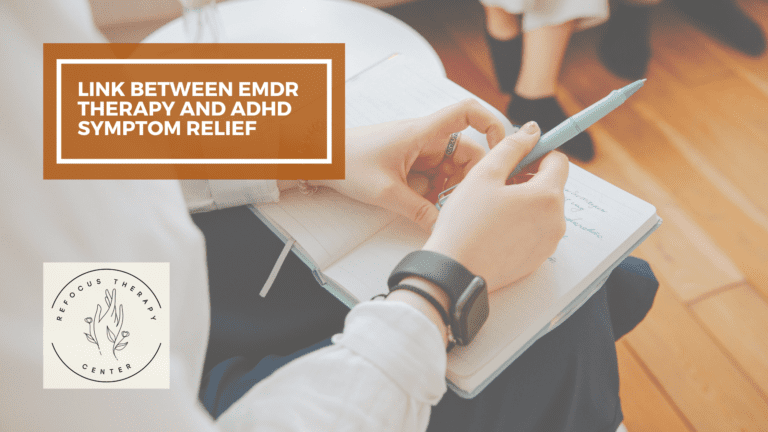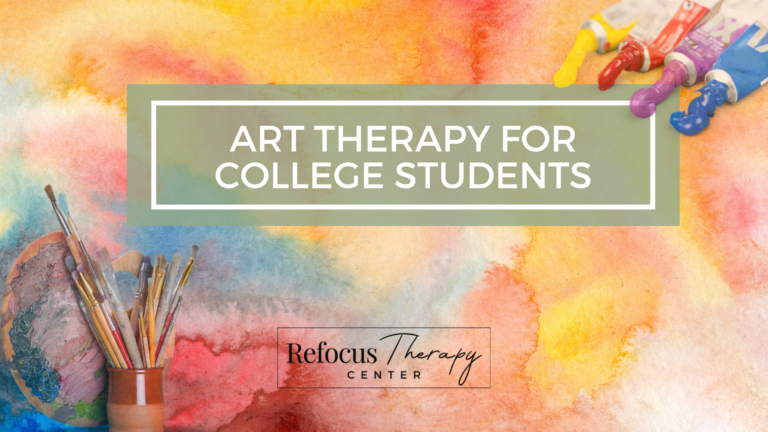EMDR and ADHD: Introduction
ADHD is a condition that affects millions of individuals worldwide, bringing challenges to their daily lives. Common symptoms include impulsivity, inattentiveness, difficulty with organization, and concentration problems. These symptoms can contribute to various day-to-day challenges, often impacting work, relationships, and overall quality of life. In addition to these core symptoms, many individuals with ADHD also experience co-occurring conditions such as anxiety, low self-esteem, negative self-talk, and low mood.
The integration of EMDR and ADHD” in therapeutic practices is gaining attention as a potential means to address not only the primary symptoms of ADHD but also the secondary challenges that often accompany the condition. This approach aims to provide a holistic and effective means of support for those with ADHD, promoting better management of symptoms and improved wellbeing.
Traditional approaches to managing ADHD have primarily focused on medication management, ADHD coaching and behavioral interventions. However, there is a growing interest in exploring alternative therapeutic methods to support individuals with ADHD. Eye Movement Desensitization and Reprocessing (EMDR) is a psychotherapy technique traditionally used to treat trauma.
This blog will further explore potential benefits, risks, and considerations of using EMDR as a tool for managing ADHD symptoms, shedding light on whether this innovative approach could offer a new pathway to improved daily functioning and overall well-being for those living with ADHD.
What is EMDR?
EMDR is a therapeutic approach first developed for treating PTSD and has been shown to also be helpful for other mental health conditions including anxiety and depression. The success of EMDR in treating trauma has prompted mental health professionals to explore its potential benefits for various other psychological disorders, including ADHD.
EMDR involves the use of bilateral stimulation to help individuals process and integrate traumatic memories, with the goal to reduce the emotional charge associated with those memories. This method encourages the brain to resume its natural healing process, making distressing memories less impactful over time.
The goal of bilateral stimulation is to calm the nervous system, reducing emotional charge of upsetting memories and allowing for more adaptive coping. EMDR can be done with a trained therapist.
ADHD and its Impact
ADHD can significantly impact an individual’s ability to focus, manage time, and regulate emotions. This can lead to difficulties in academic, professional, strained relationships and a diminished sense of self-worth.
The constant struggle to manage symptoms can often be frustrating and exhausting. Individuals with ADHD may also experience co-occurring conditions such as anxiety, depression, and sleep disturbances. The effect of these challenges can have a significant impact on an individual’s self-esteem and overall quality of life.
EMDR and ADHD – The Connection
While the research exploring EMDR as a treatment for ADHD is still in its infancy, there is potential for significant overlap. Just as EMDR helps individuals reprocess traumatic memories, it may also assist those with ADHD in processing sensory and emotional experiences more effectively. This could potentially lead to improved attention regulation and emotional balance, thereby possibly reducing some of the core symptoms of ADHD.
For instance, individuals with ADHD often experience repeated failures and criticisms, which can accumulate over time and contribute to a negative self-image. EMDR can target these distressing memories and facilitate a more adaptive processing of these experiences, thereby reducing their impact on ADHD symptoms. Often times individuals with ADHD are told they are lazy, unmotivated, or just need to “focus” at a young age- which can affect their view of self.
Potential Benefits of EMDR for ADHD
Some research suggests that EMDR could offer several benefits for ADHD management, this may include:
- Enhanced Attention and Focus: EMDR may help in reducing internal emotional noise, which may help individuals with ADHD develop better concentration and focus.
- Improved Self-Esteem and Confidence: Many individuals with ADHD reports struggling with negative self talk or low self esteem. By processing past failures and criticisms, individuals with ADHD may experience improved self-esteem and confidence.
- Increased Emotional Regulation: Individuals with ADHD often struggle with emotional regulation. EMDR can facilitate a more adaptive processing of emotional experiences, leading to better emotional regulation. EMDR can assist in processing emotional responses, potentially leading to improved emotional balance and resilience.
- Reducing the Impact of Past Trauma: EMDR is proven effective in treating trauma, and it can be instrumental in addressing past traumatic events that might be contributing to ADHD symptoms or exacerbating them.
- Reduced Hyperactivity and Impulsivity: As individuals learn to process and integrate their experiences, symptoms of hyperactivity may decrease. EMDR can help in regulating emotional responses, which may, in turn, reduce hyperactive and impulsive behavior.
- Reducing Symptoms of Depression and Anxiety: ADHD often co-occurs with mental health conditions such as depression and anxiety. EMDR can help alleviate the emotional distress associated with these co-occurring disorders, thereby improving the overall psychological well-being of individuals with ADHD.
Understanding the Risks and Limitations of EMDR and ADHD Treatment
While EMDR has shown potential in managing ADHD symptoms, it is crucial to understand that, like any therapeutic intervention, it comes with its own set of risks and limitations.
Emotional Distress: EMDR involves recalling and processing distressing memories, which can sometimes intensify emotional distress before it improves. This can be particularly challenging for individuals with ADHD who may already struggle with emotional regulation.
Not a Standalone Treatment: EMDR should not be considered a standalone treatment for ADHD. It may be most effective when used in combination with other therapeutic interventions such as medication, cognitive-behavioral therapy, or ADHD coaching.
Lack of Comprehensive Research: The application of EMDR for ADHD is still a relatively new area of research. While there are anecdotal accounts and some preliminary studies suggesting its benefits, more comprehensive research is needed to fully understand its efficacy and long-term impacts.
Potential for Misdiagnosis: ADHD symptoms can sometimes overlap with symptoms of other psychological disorders such as PTSD, anxiety, or depression. There is a risk that EMDR may be used to treat symptoms that are not directly related to ADHD, which can complicate the treatment process.
Requirement for Skilled Practitioners: EMDR should only be administered by trained and certified EMDR practitioners. The quality of the therapeutic experience and outcomes can vary significantly depending on the skill level of the therapist.
Individual Variability in Effectiveness: Like any therapeutic intervention, EMDR may not be effective for everyone. People with ADHD have diverse experiences and symptom presentations, and while some may find significant relief through EMDR, others may not experience the same benefits. This variability can depend on multiple factors including the individual’s unique ADHD symptoms, their history of trauma, and how they respond to EMDR as a therapeutic technique. It’s important to maintain realistic expectations and have open communication with the therapist about the progress and effectiveness of the treatment.
Practical Considerations and Limitations
While the potential benefits of EMDR for ADHD are promising, it’s important to remember that this field of study is still developing. There is a need for more comprehensive research to validate these preliminary findings. Furthermore, EMDR should be approached as one component of a holistic treatment plan for ADHD, potentially complementing other therapies and strategies. While EMDR has shown promise in managing ADHD symptoms, it is essential to consider the following:
Individual Differences: ADHD symptoms vary significantly from person to person. EMDR may be more effective for some individuals than others.
Co-occurring Conditions: ADHD often co-occurs with other psychological disorders. A comprehensive assessment is crucial to determine the most appropriate intervention.
Need for Further Research: The application of EMDR and ADHD is a relatively new area of exploration. More research is needed to establish its efficacy.
Conclusion: ADHD and EMDR
While more research is needed, EMDR presents a promising avenue for ADHD management. By addressing the unique neurological pathways involved in ADHD, EMDR could help individuals process their experiences more effectively, leading to improved attention, emotional regulation, and overall well-being.
Are you curious about how EMDR could benefit you or a loved one in managing ADHD symptoms? With specialized training in EMDR, trauma, and ADHD, I am equipped to guide you through the process and help determine if EMDR is the right fit for your unique needs. Don’t hesitate to contact Miranda today and embark on a path towards a more focused and balanced life.
“While EMDR will not alleviate an ADHD diagnosis, it can help those who struggle with ADHD symptoms live a happier, more productive life. EMDR helps clients to develop a more positive self-image, self-confidence, and live a better quality of life.”
Rebecca Kase, EMDR Therapy Helps People Heal From Experiences That Haunt Them
Let’s Connect – Next Steps
Ready to explore the potential benefits of EMDR for managing ADHD symptoms? I’m here to support you on your journey towards healing and growth. Schedule a consultation today to discuss how we can work together to address your unique challenges and goals. Let’s take the first step towards a more empowered future.
Have questions or need more information? Feel free to reach out. I am here to provide the answers, support, and guidance you need on your path to wellness.
Learn More
If you’re interested in diving deeper into the connection between EMDR, trauma, and ADHD, you’re in the right place. I am passionate about educating and empowering individuals on their journey to better mental health. Contact Refocus Therapy Center today to learn more about how these interconnected areas can impact your life and how we can work together to create positive change.
ADHD Organizations:
- Children and Adults with Attention-Deficit/Hyperactivity Disorder (CHADD)
- Attention Deficit Disorder Association (ADDA)
- neurodiverging.com
- neuroclastic.com
EMDR Organizations:
Mental Health Resources:
Educational Resources:
- Understood.org: (resources for learning and attention issues)
- ADDitude Magazine










